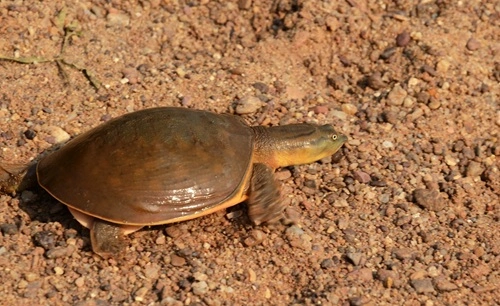Indian Flapshell Turtle is a freshwater species of softshell turtle widely distributed throughout the Indian subcontinent. It is a connecting evolutionary link between softshell and hardshell turtles. The name ‘Flapshell’ is derived from the femoral flaps on its plastron, which closes when its limbs are retracted. Indian Flapshell Turtles have a flattened, oval-shaped shell, with dark brown or black spots or lines on it. The males measure 18-20 cm in length, while females are slightly longer at 22-24 cm.
Indian Flapshell Turtles are found in various types of freshwater habitats, including streams, lakes, rivers, ponds, tanks and irrigation canals. They prefer shallow, quiet and even stagnant waters with plenty of vegetation. Indian Flapshell Turtles are largely found in India, Nepal, Sri Lanka, Pakistan, Bangladesh and Myanmar.

Legal Status in India
Indian Flapshell Turtle is protected under Schedule I Part II of the Wildlife Protection Act, 1972. Consequently, there is a nationwide ban on hunting, trade, possession and transportation of Indian Flapshell Turtle. It has been categorised as Class 1 species of water animals in the Wildlife Protection Act. Schedule I makes all the activities prohibited under it as non-bailable offences.
The need to protect Indian Flapshell Turtle arose due to multiple threats to its existence, thereby necessitating conservation efforts. Indian Flapshell Turtles face the threat of exploitation due to their meat and eggs, which are believed to possess aphrodisiac properties. Moreover, their shells are believed to be effective in traditional medicines. Consequently, Indian Flapshell Turtles are major targets of smugglers and poachers. Habitat destruction caused by pollution, riverbank cultivation and dam construction also pose a major threat to Indian Flapshell Turtles.
Indian Flapshell Turtle comes in the ‘Vulnerable’ category in the IUCN Red List. Vulnerable indicates that the species faces a high risk of extinction in the wild and at a risk of becoming endangered or critically endangered, in the absence of conservation efforts.
Challenges to Conservation
A 2023 study conducted by the Wildlife Conservation Society-India found that softshell turtles, including Indian Flapshell Turtles, are high on demand for their meat and trafficked through a wide network, with major Indian cities acting as hubs for transit, import and export.
As per the study, Indian Flapshell Turtles and other species of softshell turtles are mostly trafficked from Varanasi, Sultanpur, Jaunpur and Pratapgarh in Uttar Pradesh to North 24-Parganas and other districts in West Bengal, and thence to Bangladesh.
Indian Flapshell Turtles and other species of softshell turtles are in decline in the Gangetic plain due to illegal hunting and trade.


